The buttery autumn sunlight lights up Leptis Magna, the Roman ruins an hour's drive east of Tripoli. It softens the craggy inscriptions on the arch of Septimius Severus, the first-century emperor who came from what is now Libya, and falls on the theatre, turning the relics of long-forgotten wars, conquests and subjugation into a pleasant place to stroll.

But this morning there is brisk movement as a few dozen Libyan archaeologists - with GPS devices, cameras and notebooks in hand - prepare to head out to the site.
Although Libya is more famous for its former dictator and oil wealth, the country is part of the ribbon of rich, North African territory that was coveted and colonised by successive empires, many of which left behind glorious cities and treasures.
The archaeologists study everything, from arrowheads used by the first nomads in the deep south of the country's deserts, to the Greek city of Cyrene far to the east of Benghazi founded, according to legend, by a prince cast out by his own people for having a lisp.
Among the academics is Ahmed Mousa Masoud, 28, who is employed by oil companies to survey archaeological sites before exploration begins, and whose love of the ancient world began right here, while growing up in the nearby town of Khoms.
"I would come here alone," he said. "The sea here and the ruins here, and the silence and the quietness. When I got into the ruins, I just fell in love with them."
Along with his colleagues, he complains that under Libya's former leader, Muammar Qaddafi, the subject was neglected in universities. The ministry of antiquities was understaffed, there was no comprehensive cataloguing of the sites in the country and foreigners carried out most of the archaeological work because Libyans lacked the skills.
Paul Bennett, the head of mission for the Society for Libyan Studies in London, told Nature magazine last year that "everything is vulnerable".
"There's a need to develop, from a standing start, a cultural-resource management in Libya that doesn't really exist at the moment," he said.

This includes recording damage caused by last year's war that unseated and eventually killed Qaddafi. A team is heading to Sabratha, a site near a beach just west of Tripoli, to verify reports of damage caused by shooting, while the search continues for a trove of coins and golden artefacts looted from the museum in Benghazi.
The threat of bombing loomed over Leptis during the fighting. As Nato targeted Qaddafi's strategic assets during the summer of 2011, there were reports that tanks and heavy weapons were hidden among the colonnades of Leptis.
At the time, a spokesman for the military operation refused to rule out an attack on the site if the reports were true. But Ali Salim, who works in the gift shop, said that there had been little real fighting around the ruins.
Locals, fearful of having the valuable tourist site spoiled, guarded the site and adjacent study centre. It escaped unscathed and, earlier this month, 12 Libyan travel companies showcased their attractions for the first time at the World Travel Market event in London.
The response was positive, with more than half of respondents to a survey at the exhibition saying that the country could have potential in the future, if it improves its shoddy infrastructure and the fighting calms. Indeed, despite Qaddafi's eccentric autocracy, some tourists did visit Libya before last year's conflict. More than 100,000 arrived in 2007, said Jeff Wilson, who has headed the Libya Travel and Tours company since 2009.
Nearby countries, such as Morocco, Tunisia and Egypt, he said, derive large chunks of their income by marketing warm weather, pleasant beaches and remnants of ancient culture to tourists, and his company saw equal, if not greater, potential in Libya.
"If you look at Libya, the ruins, the desert, the coastline - the raw materials are better than in the neighbouring countries," he said.
Most of his clients spend time at Leptis Magna, then fly east in the direction of Benghazi to see Cyrene. Other companies focus on the desert that makes up most of the land mass of Libya, taking visitors on camel treks, camping trips and to visit oases.
Security concerns, which have heightened in recent months, have ruled out trips to the restive mountains of the west, closed some of the museums and curtailed tourist visas, but the tourism ministry is up and running, and ambitious. Mr Wilson hopes the authorities will try to realise the country's potential.
"Most people are amazed at the size of the historical sites - the museums are amazing, the statues and mosaics are fabulous," he said. "But they do mention that there needs to be some upkeep ... it's up to the government to turn the sites into something spectacular. Leptis is only 25 per cent excavated."
Daoud Idriss, one of the archaeologists training at Leptis Magna, hopes the visitors come soon. He grew up near Cyrene and looks back to what he said was Libya's time of civilisation.
"I don't think there's civilisation here now," he said. "Qaddafi rased it all." He now hopes that Libyans will view their country's history as an investment.
"We need to make people think of the ancient cities in the same way as they think about oil," he said. "They should let people realise the ruins are part of the Libyan soul, and not just rocks."
Author: Alice Fordham | Source: The National [December 19, 2012]